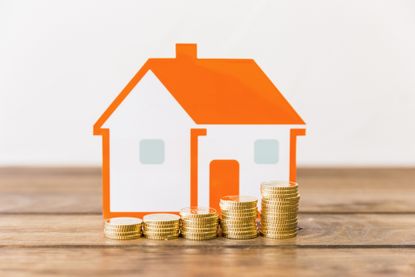Why does it cost so much to sell a house?
From staging to commission expenses, here's what to expect


You hear a lot about the burdensome cost of buying a home, but less about the costs that are involved in selling. Like the price of homebuying, the cost of selling a home can be steep. In some cases, too steep, as a federal jury ruled in late October that "the powerful National Association of Realtors and several large brokerages had conspired to artificially inflate the commissions paid to real estate agents," The New York Times reported.
It's predicted this ruling could lead to major shifts in "the way agent commissions are now paid," causing "home buyers and home sellers to now question the standard practice of setting commissions between 5 and 6 percent," according to the Times. While that would certainly help ease the cost of selling, it wouldn't bring it down to zero, given all of the other costs that are typically involved in a home sale.
How much does it generally cost to sell a house?
The average "total cost of selling a house is about 10% of the sale price," according to Rocket Homes. The upper limit of average is a little bit higher, in Quicken Loans' estimate, generally around "10% – 15% of your home’s sale price."
Subscribe to The Week
Escape your echo chamber. Get the facts behind the news, plus analysis from multiple perspectives.

Sign up for The Week's Free Newsletters
From our morning news briefing to a weekly Good News Newsletter, get the best of The Week delivered directly to your inbox.
From our morning news briefing to a weekly Good News Newsletter, get the best of The Week delivered directly to your inbox.
Here's an example of how that would play out: If you were to end up paying 10% of your home's sale price, "this means if you sell your house for $200,000, you can expect to subtract $20,000 from your overall profit on the sale," per Rocket Homes.
What costs are involved in selling a house?
So exactly what expenses are you covering as a home seller? Here are some of the common expenses you may pay:
- Home preparation: Before you put your home on the market, you need to make sure it's ready, which can involve any necessary repairs and perhaps some cosmetic updates. According to Quicken Loans, "the average cost of sellers’ home repairs is often reported to be roughly $3,500 – $5,000."
- Home staging: Another part of getting your home ready to show is staging, which involves arranging furniture and decor throughout your house. This can pay off, as it may help your home sell faster and for a higher price. However, expect to pay an average of $1,776, per U.S. News & World Report based on data from Home Advisor.
- Real estate commission: The largest chunk of selling costs is usually real estate commission fees, which generally run 5% to 6% of the home sale price, per Rocket Homes. According to U.S. News & World Report, "while it is possible to negotiate real estate commission, it's unlikely that it will be lowered."
- Closing costs: Closing costs, which are "fees that are paid to finalize the transaction and transfer ownership of the home to the buyer," can also constitute a large portion of your home sale costs, as "sellers can expect to pay 2% to 4% of the sale price of the home in fees and taxes," per U.S. News & World Report.
- Taxes: You'll also likely lose some money to taxes when you're selling. Though many are eligible for a capital gains tax exemption up to $250,000, those who aren't will have to pay capital gains taxes if they sell their home for more than they paid for it, explained Bankrate. Other taxes you might pay are property tax and real estate transfer tax.
- Mortgage payoff: "If you are still paying on your mortgage, you’ll have to pay off your mortgage with the profit from the home sale," Quicken Loans explained. Further, some mortgages charge a prepayment penalty, which will get added to the balance you owe.
Is there any way to reduce the cost of selling a home?
There are a few things you can do to mitigate the amount you end up paying to sell:
- Reconsider optional costs: Not every cost involved in selling a home is totally necessary. For instance, you might skip out on staging or improvements and opt to sell your home as-is.
- DIY minor repairs: You might be able to save if you do some things yourself. However, consider "the time involved and whether an expert will do the job better," Rocket Homes advised.
- Shop around for agents: Before settling on a listing agent, interview some different candidates and find out how much they charge. Per Nerdwallet, "some are willing to negotiate their rates," though you'll want to "make sure you agree on commission terms in writing."

Continue reading for free
We hope you're enjoying The Week's refreshingly open-minded journalism.
Subscribed to The Week? Register your account with the same email as your subscription.
Sign up to our 10 Things You Need to Know Today newsletter
A free daily digest of the biggest news stories of the day - and the best features from our website
Becca Stanek has worked as an editor and writer in the personal finance space since 2017. She previously served as a deputy editor and later a managing editor overseeing investing and savings content at LendingTree and as an editor at the financial startup SmartAsset, where she focused on retirement- and financial-adviser-related content. Before that, Becca was a staff writer at The Week, primarily contributing to Speed Reads.
-
 Today's political cartoons - December 3, 2023
Today's political cartoons - December 3, 2023Cartoons Sunday's cartoons - life expectancy goes up, Kissinger goes down, and more
By The Week US Published
-
 10 things you need to know today: December 3, 2023
10 things you need to know today: December 3, 2023Daily Briefing Gaza residents flee as Israel continues bombardment, Trump tells supporters to 'guard the vote' in Democratic cities, and more
By Justin Klawans, The Week US Published
-
 5 X-plosive cartoons about Elon Musk
5 X-plosive cartoons about Elon MuskCartoons Artists take on his proposed clean-up of X, his views on advertisers, and more
By The Week US Published
-
 6 tips to shop online safely this holiday season
6 tips to shop online safely this holiday seasonThe Explainer Lower the chances of credit card fraud spoiling your holidays
By Becca Stanek, The Week US Published
-
 Renting a car this holiday season? 5 tips to keep in mind
Renting a car this holiday season? 5 tips to keep in mindThe Explainer From filling the tank yourself to using your own insurance, here's how to save on car rentals
By Becca Stanek, The Week US Published
-
 What to do if your bank closes your account and how to avoid it
What to do if your bank closes your account and how to avoid itThe Explainer There are steps you can take to prevent the nightmare scenario of an unexpected closure
By Becca Stanek, The Week US Published
-
 How leasehold reforms could help homeowners
How leasehold reforms could help homeownersThe Explainer The government has introduced new legislation to address unfair fees and exploitation in the leasehold system
By Marc Shoffman, The Week UK Published
-
 Prices are going down. Here's where you can see the difference.
Prices are going down. Here's where you can see the difference.The Explainer 'An era of price hikes is fading,' but that doesn't mean prices will all come down
By Becca Stanek, The Week US Published
-
 6 ways your local library can save you money
6 ways your local library can save you moneyThe Explainer 'Before you buy something, see if you can borrow it from the library'
By Becca Stanek, The Week US Published
-
 Guide to holiday season tipping: Who to tip and how much to give
Guide to holiday season tipping: Who to tip and how much to giveThe Explainer It's time to start making your list and checking it twice
By Becca Stanek, The Week US Published
-
 5 tips for giving to charity this holiday season
5 tips for giving to charity this holiday seasonThe Explainer By being strategic about your gifting, you can maximize the impact of the donations you make this year
By Becca Stanek, The Week US Published










